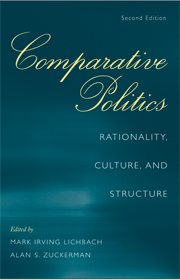Book contents
- Frontmatter
- Contents
- Contributors
- Preface and Acknowledgments
- 1 PARADIGMS AND PRAGMATISM
- 2 THINKING AND WORKING IN THE MIDST OF THINGS
- 3 ADVANCING EXPLANATION IN COMPARATIVE POLITICS
- 4 STRONG THEORY, COMPLEX HISTORY
- 5 RECONSIDERATIONS OF RATIONAL CHOICE IN COMPARATIVE AND HISTORICAL ANALYSIS
- 6 CULTURE IN COMPARATIVE POLITICAL ANALYSIS
- 7 RESEARCHING THE STATE
- 8 AN APPROACH TO COMPARATIVE ANALYSIS OR A SUBFIELD WITHIN A SUBFIELD?
- 9 THE GLOBAL CONTEXT OF COMPARATIVE POLITICS
- 10 COMPARATIVE PERSPECTIVES ON CONTENTIOUS POLITICS
- 11 CITIZENSHIP IN DEMOCRATIC POLITICS
- 12 NESTED CITIZENS
- 13 BACK TO THE FUTURE
- 14 THE COMPARATIVE POLITICAL ECONOMY OF THE WELFARE STATE
- 15 MAKING CAUSAL CLAIMS ABOUT THE EFFECT OF “ETHNICITY”
- References
- Author Index
- Subject Index
- Titles in the series
4 - STRONG THEORY, COMPLEX HISTORY
STRUCTURE AND CONFIGURATION IN COMPARATIVE POLITICS REVISITED
Published online by Cambridge University Press: 05 June 2012
- Frontmatter
- Contents
- Contributors
- Preface and Acknowledgments
- 1 PARADIGMS AND PRAGMATISM
- 2 THINKING AND WORKING IN THE MIDST OF THINGS
- 3 ADVANCING EXPLANATION IN COMPARATIVE POLITICS
- 4 STRONG THEORY, COMPLEX HISTORY
- 5 RECONSIDERATIONS OF RATIONAL CHOICE IN COMPARATIVE AND HISTORICAL ANALYSIS
- 6 CULTURE IN COMPARATIVE POLITICAL ANALYSIS
- 7 RESEARCHING THE STATE
- 8 AN APPROACH TO COMPARATIVE ANALYSIS OR A SUBFIELD WITHIN A SUBFIELD?
- 9 THE GLOBAL CONTEXT OF COMPARATIVE POLITICS
- 10 COMPARATIVE PERSPECTIVES ON CONTENTIOUS POLITICS
- 11 CITIZENSHIP IN DEMOCRATIC POLITICS
- 12 NESTED CITIZENS
- 13 BACK TO THE FUTURE
- 14 THE COMPARATIVE POLITICAL ECONOMY OF THE WELFARE STATE
- 15 MAKING CAUSAL CLAIMS ABOUT THE EFFECT OF “ETHNICITY”
- References
- Author Index
- Subject Index
- Titles in the series
Summary
This is a chapter of admiration, concern, and exhortation.
The admiration is for recent research and writing in comparative politics that are as impressive in their way as the landmark structural studies of vast historical change written in the 1960s and 1970s. Building on the intervening generation's diverse institutional studies, this scholarship has been oriented to important problems, notably including politicized identities, civil violence, sources of political legitimacy, and dimensions of inequality. Adopting a mainly pragmatic attitude about method, this work has shown a healthy disrespect both for overly stylized battles about paradigms and for persisting disciplinary tensions that pit qualitative against quantitative methods. Instead, its practitioners prefer to move back and forth from structural to agent-centered levels of analysis via the mediation of historical and rational choice institutional analysis.
There also has been a robust and unanticipated revival of writing based on “huge comparisons” of “big structures” and “large processes” (Tilly 1984). These studies exhibit substantive scope and methodological imagination to ask compelling questions about the creation and character of the modern world. Further, across many spheres in the social sciences, including areas that previously had been rather ahistorical, scholars have taken to heart the idea that social science and history cannot be constituted meaningfully without each other (Pierson and Skocpol 2002; Mahoney and Rueschemeyer 2003).
It would have been difficult to predict this efflorescence a decade ago. Large-scale historical social science seemed a spent force.
- Type
- Chapter
- Information
- Comparative PoliticsRationality, Culture, and Structure, pp. 96 - 116Publisher: Cambridge University PressPrint publication year: 2009
- 6
- Cited by



